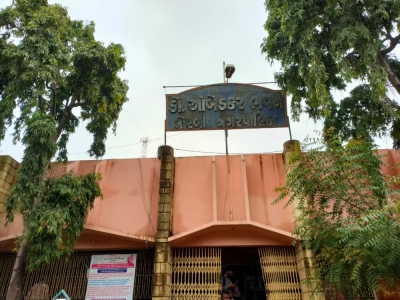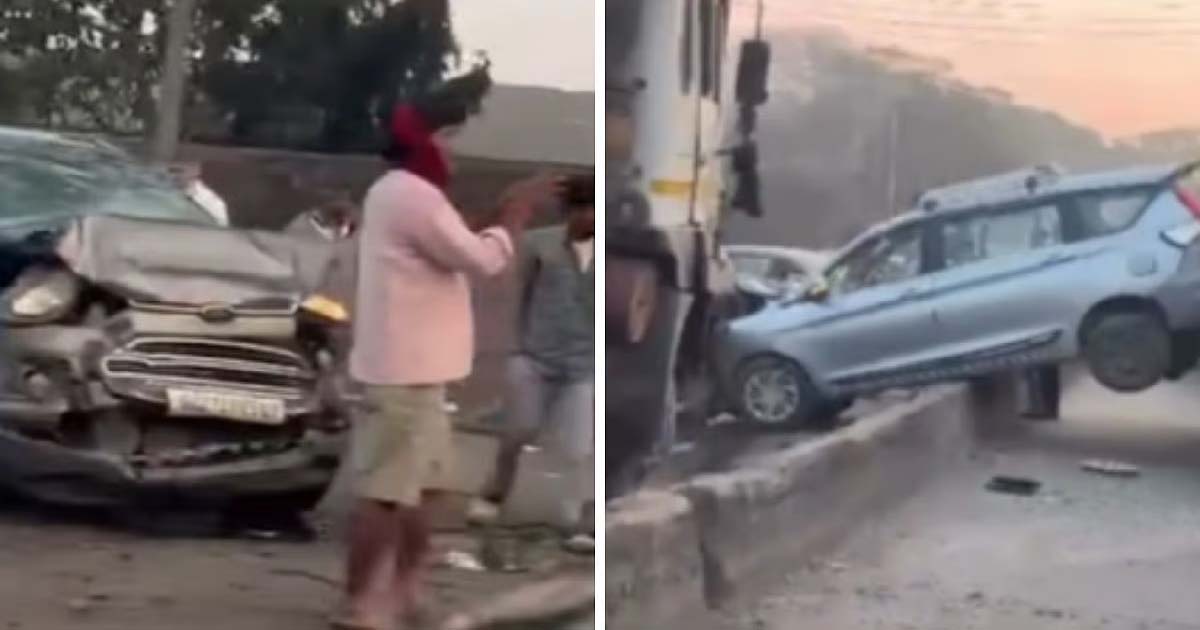National News
Morbi councillors oppose Guj govt’s move to supersede nagarpalika

The councillors of the Morbi Nagarpalika have opposed the Gujarat government’s move to supersede it.
The councillors have written a letter to Chief Minister Bhupendra Patel opposing the state government’s move.
After the collapse of the suspension bridge on the Machchu River on October 30, in which 135 people were killed, the Gujarat government informed the Gujarat High Court that it will supersede the nagarpalika.
Of the 52 elected members in the Morbi nagarpalika, 47 members have opposed this. In the letter to the chief minister these councillors have stated that they had no role in giving the repair contract to Oreva group.
Councillors have said in the letter that it was the decision of the nagarpalika president, vice president and standing committee chairman. All 52 councillors are from the BJP. One of the councillors, Devabhai Avadiya told IANS, “We 47 councillors have no idea whether there was any agreement between nagarpalika and the Oreva group, the resolution was never put up for voting in the general board. In such a case, how can the government hold all 52 councillors responsible for the negligence.”
He further said, “After superseding nagarpalika, even after fresh elections are held, leaders like him will not have difficulty in getting reelected to the nagarpalika, but about those who had won the election with thin margin or are not financially sound to bear election expenses, why should they be punished.”
BJP nagarpalika leader Kamlesh Desai has said that 47 councillors have signed the letter and two more will sign the letter, after which they plan to post it to the Chief Minister and will also request for a personal meeting. He has appealed to the Chief Minister to take all councillors in confidence before taking the extreme step of superseding the nagarpalika.
National News
BMC Elections 2026: Mumbai Candidates Declare Massive Surge In Assets, Multi-Crore Wealth Revealed In Affidavits

Mumbai, Jan 08: Details of assets, profession and criminal records of selected candidates contesting the upcoming civic elections in Mumbai, as declared in their affidavits, are as follows:
Shaila Dilip Lande – Shiv Sena (Shinde), Ward 163 (Saki Naka)
Profession: Business
Total movable and immovable assets as of 2025: ₹8,18,76,134
Total movable and immovable assets as of 2017: ₹14,27,651
Criminal cases: 0
Found guilty: 0
Kamalakar Naik – Independent, Ward 169 (Kurla Nehru Nagar)
Profession: Business
Total movable and immovable assets as of 2025: ₹11,83,36,519
Total movable and immovable assets as of 2017: ₹1,92,76,226
Criminal cases: 2
Found guilty: 0
Dhanajay Pisal – Nationalist Congress Party (Ajit Pawar), Ward 111 (Kanjur Village)
Profession: Service
Total movable and immovable assets as of 2025: ₹21,82,57,202
Total movable and immovable assets as of 2019: ₹8,55,21,925
Criminal cases: 0
Found guilty: 0
Sonam Manoj Jamsutkar – Shiv Sena (UBT), Ward 210 (Mumbai Central)
Profession: Business
Total movable and immovable assets as of 2025: ₹14,38,84,259
Total movable and immovable assets as of 2017: ₹7,08,67,928
Criminal cases: 0
Found guilty: 0
Geeta Gawli – Akhil Bhartiya Sena, Ward 212 (Mahalaxmi–Umar Park)
Profession: Business
Total movable and immovable assets as of 2025: ₹7,26,92,393
Total movable and immovable assets as of 2017: ₹3,45,32,902
Criminal cases: 0
Found guilty: 0
Sana Haji Halim Khan – Shiv Sena (UBT), Ward 96 (Bandra East)
Profession: Not mentioned
Total movable and immovable assets as of 2025: ₹9,46,03,435
Total movable and immovable assets as of 2017: Not contested
Criminal cases: 0
Found guilty: 0
Nehal Shah – Independent, Ward 177 (Matunga)
Profession: Business
Total movable and immovable assets as of 2025: ₹7,04,11,095
Total movable and immovable assets as of 2017: ₹1,69,77,255
Criminal cases: 0
Found guilty: 0
Rajul Sameer Desai – BJP, Ward 56 (Goregaon)
Profession: Business
Total movable and immovable assets as of 2025: ₹24,28,81,925
Total movable and immovable assets as of 2017: ₹1,79,69,000
Criminal cases: 0
Found guilty: 0
Prabhakar Shinde – BJP, Ward 106 (Mulund)
Profession: Business
Total movable and immovable assets as of 2025: ₹17,63,01,181
Total movable and immovable assets as of 2017: ₹57,46,971
Criminal cases: 0
Found guilty: 0
Neil Somaiya – BJP, Ward 107 (Mulund)
Profession: Business
Total movable and immovable assets as of 2025: ₹9,89,21,872
Total movable and immovable assets as of 2017: ₹1,99,37,809
Criminal cases: 0
Found guilty: 0
National News
Major Accident On Ghodbunder Road: Multi-Vehicle Crash Near Gaimukh Disrupts Traffic Between Thane & Mira Road

Thane: A major road accident was reported on Ghodbunder Road near Gaimukh Ghat in Thane on Friday morning, leading to severe traffic congestion on one of the city’s most crucial arterial routes. The accident, which occurred around 7 am on National Highway 48 (NH-48), involved multiple vehicles and caused major disruption to traffic movement towards Mira Road and Gujarat.
According to reports, at least five to six vehicles were involved in a chain collision at a sharp curve near Gaimukh Ghat. The vehicles reportedly rammed into each other head-on in quick succession, resulting in extensive damage. Visuals from the spot showed several cars badly mangled, with some vehicles almost completely crushed due to the impact.
The accident triggered long queues of vehicles on Ghodbunder Road, a key connector between Thane, Mumbai’s western suburbs and Gujarat. Traffic from Thane towards Mira Road and the Gujarat-bound route was particularly affected, with commuters facing long delays during peak morning hours.
Emergency response teams rushed to the site soon after the incident. Personnel from the Regional Disaster Management Cell (RDMC) and the Fire Brigade were deployed to carry out rescue operations and remove the damaged vehicles from the road. Traffic police also reached the spot to manage congestion and divert vehicles where possible, while clearance work continued to restore normal traffic flow.
Despite the severity of the crash and the extent of damage to the vehicles, an Media report quoting officials confirmed that there were no fatalities. Considering the violent nature of the collision, authorities initially feared the possibility of serious casualties. However, it was later confirmed that no lives were lost in the incident. A few commuters sustained minor injuries and were provided medical treatment at nearby hospitals.
The exact cause of the accident is yet to be ascertained. Initial indications suggest that poor visibility, high speed or misjudgment at the ghat curve may have contributed to the collision. A detailed investigation will be carried out to determine the precise sequence of events.
In the aftermath of the accident, commuters were advised to avoid or postpone travel towards Gaimukh Ghat until further updates are issued. Authorities warned that traffic congestion is likely to persist for some time as clearance operations continue and normal movement is gradually restored.
Ghodbunder Road is considered one of Thane’s most important traffic corridors, handling heavy daily vehicular movement. The incident once again sheds light on the need for cautious driving on ghat sections, especially during early morning hours. Further details are awaited as officials continue to assess the situation and ease traffic conditions.
National News
Plot to shift Mumbai assets to Gujarat: Raj Thackeray in Saamana

Mumbai, Jan 9: In a scathing revelation during the second part of the joint interview in ‘Saamana’ with Uddhav Thackeray, the Maharashtra Navnirman Sena chief Raj Thackeray on Friday alleged a deep-rooted “strategic plot” to strip Mumbai of its wealth and territory.
He warned that the threat to Mumbai’s autonomy is now greater than it was during the Samyukta Maharashtra movement of the 1950s.
Raj Thackeray noted a significant shift in the motives of those opposing Mumbai’s interests. While past conflicts were primarily about the city’s wealth, he claimed the current objective is to physically break off pieces of the city.
“During the Samyukta Maharashtra movement, a few non-Marathi wealthy elites wanted Mumbai to go to Gujarat. Today, those five people have grown into five hundred,” he stated. He emphasised that the manner in which the Central and state governments are coordinating projects suggests a level of danger never felt before.
Questioning the intent behind infrastructure projects in the Mumbai Metropolitan Region (MMR), Raj Thackeray asked why airports are being planned adjacent to the Vadhavan Port near the Gujarat border. He suggested these are not just development projects but “strategic manoeuvres” to connect Maharashtra’s economic hubs more closely with Gujarat while hollowing out Mumbai’s core.
Raj Thackeray claimed that the development of the Navi Mumbai International Airport and the Vadhavan Port are part of a larger plan to vacate prime land in the heart of Mumbai. He alleged that the government has already begun the process of shifting cargo operations from Mumbai’s “rightful” airport to Navi Mumbai. He predicted that eventually, all domestic and international operations would be moved out.
“The current Mumbai airport area is so vast that at least 50 Shivaji Parks could fit inside it. The plan is to move all flights to Navi Mumbai and then put this massive tract of Mumbai’s land up for sale,” he claimed.
“The math is clear: they want the wealth of Mumbai to flow to a specific class and eventually to Gujarat, while the physical land of the city is carved up for real estate exploitation,” he said.
Thackeray framed this move not as urban development, but as a “strategic dismantling” of Mumbai’s assets. He suggested that by shifting the city’s core infrastructure, the administration is clearing the way for a specific class of developers and business interests to take over Mumbai’s most valuable real estate.
-

 Crime3 years ago
Crime3 years agoClass 10 student jumps to death in Jaipur
-

 Maharashtra1 year ago
Maharashtra1 year agoMumbai Local Train Update: Central Railway’s New Timetable Comes Into Effect; Check Full List Of Revised Timings & Stations
-

 Maharashtra1 year ago
Maharashtra1 year agoMumbai To Go Toll-Free Tonight! Maharashtra Govt Announces Complete Toll Waiver For Light Motor Vehicles At All 5 Entry Points Of City
-

 Maharashtra1 year ago
Maharashtra1 year agoFalse photo of Imtiaz Jaleel’s rally, exposing the fooling conspiracy
-

 National News1 year ago
National News1 year agoMinistry of Railways rolls out Special Drive 4.0 with focus on digitisation, cleanliness, inclusiveness and grievance redressal
-

 Maharashtra1 year ago
Maharashtra1 year agoMaharashtra Elections 2024: Mumbai Metro & BEST Services Extended Till Midnight On Voting Day
-

 National News1 year ago
National News1 year agoJ&K: 4 Jawans Killed, 28 Injured After Bus Carrying BSF Personnel For Poll Duty Falls Into Gorge In Budgam; Terrifying Visuals Surface
-

 Crime1 year ago
Crime1 year agoBaba Siddique Murder: Mumbai Police Unable To Get Lawrence Bishnoi Custody Due To Home Ministry Order, Says Report





















